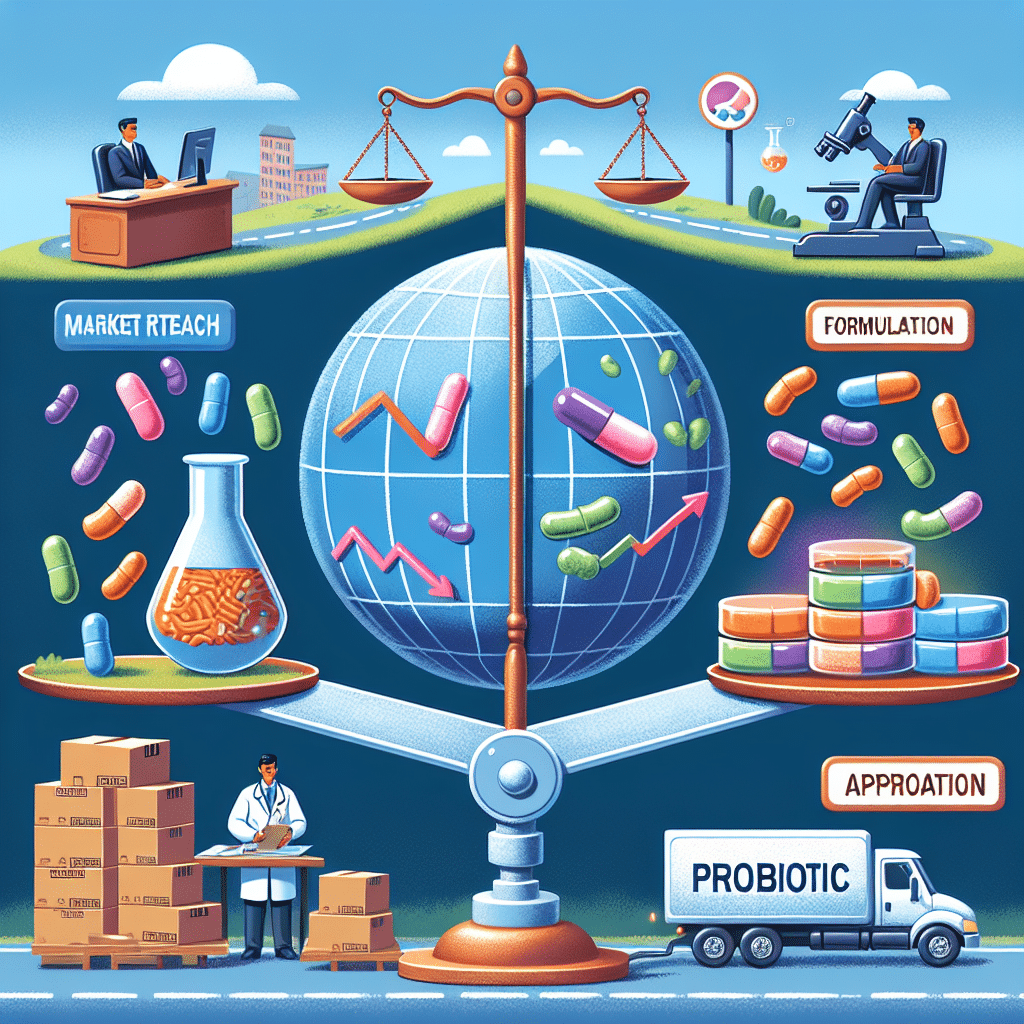Probiotic Market Entry: 4 Critical Insights for Success
-
Table of Contents
- Probiotic Market Entry: Strategies for Success
- 1. Understanding Consumer Demand and Market Trends
- 2. Regulatory Compliance and Quality Assurance
- 3. Innovative Product Development and Differentiation
- 4. Strategic Marketing and Distribution Channels
- Conclusion
- ETprotein: Enhancing Probiotic Formulations with Quality Proteins
Probiotic Market Entry: Strategies for Success

The probiotic market is a rapidly growing segment within the health and wellness industry, driven by an increasing consumer awareness of the benefits of gut health. As more companies look to enter this lucrative market, understanding the critical factors that contribute to successful market entry is essential. This article delves into four key insights that can help businesses navigate the complexities of the probiotic landscape and achieve success.
1. Understanding Consumer Demand and Market Trends
Before entering the probiotic market, it is crucial to understand the consumer base and the prevailing market trends. The demand for probiotics is influenced by factors such as demographics, health trends, and consumer education.
- Demographics: Different age groups and lifestyles have varying needs for probiotics. For instance, aging populations may seek probiotics for digestive health, while younger consumers might be interested in immune support or skin health.
- Health Trends: Current health trends, such as the focus on natural and organic products, can impact consumer preferences for probiotic strains and delivery formats.
- Consumer Education: A well-informed consumer base is more likely to invest in probiotics. Companies should invest in educational campaigns to highlight the benefits of their products.
Case studies have shown that companies that tailor their products to specific consumer needs and stay abreast of health trends are more likely to succeed. For example, a probiotic brand that launched a targeted product for women’s health saw a significant increase in market share by addressing specific concerns such as urinary tract health.
2. Regulatory Compliance and Quality Assurance
Regulatory compliance is a critical aspect of the probiotic market. Different regions have varying regulations regarding the marketing and labeling of probiotics, and it is essential for companies to navigate these regulations carefully.
- Labeling Requirements: Accurate labeling that includes strain specificity, CFU count, and health claims is essential to meet regulatory standards and build consumer trust.
- Quality Assurance: Ensuring the viability and efficacy of probiotic strains through rigorous quality control measures is crucial for maintaining product integrity.
Statistics show that products failing to meet regulatory standards can face recalls, fines, and a loss of consumer confidence. A case in point is a company that faced legal action due to misleading health claims, which resulted in a costly settlement and damage to the brand’s reputation.
3. Innovative Product Development and Differentiation
In a crowded market, product differentiation is key to standing out. Innovation in product development can come in the form of unique strains, delivery mechanisms, or combining probiotics with other health-promoting ingredients.
- Unique Strains: Researching and developing proprietary strains can provide a competitive edge and allow for patent protection.
- Delivery Mechanisms: Exploring different delivery formats such as capsules, sachets, or functional foods can cater to consumer preferences and enhance product appeal.
- Combination Products: Combining probiotics with prebiotics or other supplements can create synergistic health benefits and attract consumers looking for comprehensive solutions.
For instance, a company that introduced a probiotic-infused snack line effectively tapped into the on-the-go lifestyle trend, gaining a foothold in both the snack and probiotic markets.
4. Strategic Marketing and Distribution Channels
Effective marketing and distribution strategies are essential for reaching the target audience and ensuring product availability. Companies must consider both online and offline channels to maximize their reach.
- Online Presence: A strong online presence, including e-commerce and social media marketing, can drive awareness and sales, especially among tech-savvy consumers.
- Retail Partnerships: Establishing partnerships with health food stores, pharmacies, and supermarkets can enhance product visibility and accessibility.
- Healthcare Practitioner Endorsement: Gaining endorsements from healthcare practitioners can lend credibility and encourage consumer trust in the product.
An example of successful marketing is a probiotic brand that leveraged influencer partnerships to reach a broader audience, resulting in increased brand recognition and sales.
Conclusion
Entering the probiotic market requires a strategic approach that encompasses understanding consumer demand, ensuring regulatory compliance, innovating product offerings, and implementing effective marketing and distribution strategies. By focusing on these four critical insights, companies can position themselves for success in the competitive probiotic landscape.
ETprotein: Enhancing Probiotic Formulations with Quality Proteins
For companies looking to enhance their probiotic products, ETprotein offers a range of high-quality protein ingredients that can complement probiotic formulations. Their organic bulk vegan proteins and L-(+)-Ergothioneine are ideal for creating products that cater to health-conscious consumers seeking non-GMO, allergen-free options with a neutral taste.
ETprotein’s expertise in exporting and delivering tailor-made protein powders and nutritional supplements makes them a valuable partner for businesses aiming to succeed in the probiotic market. Their commitment to quality and customer service ensures that clients receive the best ingredients for their product development needs.
About ETprotein:
ETprotein, a reputable protein and L-(+)-Ergothioneine (EGT) Chinese factory manufacturer and supplier, is renowned for producing, stocking, exporting, and delivering the highest quality organic bulk vegan proteins and L-(+)-Ergothioneine. They include Organic rice protein, clear rice protein, pea protein, clear pea protein, watermelon seed protein, pumpkin seed protein, sunflower seed protein, mung bean protein, peanut protein, and L-(+)-Ergothioneine EGT Pharmaceutical grade, L-(+)-Ergothioneine EGT food grade, L-(+)-Ergothioneine EGT cosmetic grade, L-(+)-Ergothioneine EGT reference grade and L-(+)-Ergothioneine EGT standard. Their offerings, characterized by a neutral taste, non-GMO, allergen-free attributes, with L-(+)-Ergothioneine purity over 98%, 99%, cater to a diverse range of industries. They serve nutraceutical, pharmaceutical, cosmeceutical, veterinary, as well as food and beverage finished product distributors, traders, and manufacturers across Europe, USA, Canada, Australia, Thailand, Japan, Korea, Brazil, and Chile, among others.
ETprotein specialization includes exporting and delivering tailor-made protein powder and finished nutritional supplements. Their extensive product range covers sectors like Food and Beverage, Sports Nutrition, Weight Management, Dietary Supplements, Health and Wellness Products, and Infant Formula, ensuring comprehensive solutions to meet all your protein needs.
As a trusted company by leading global food and beverage brands and Fortune 500 companies, ETprotein reinforces China’s reputation in the global arena. For more information or to sample their products, please contact them and email sales(at)ETprotein.com today.












